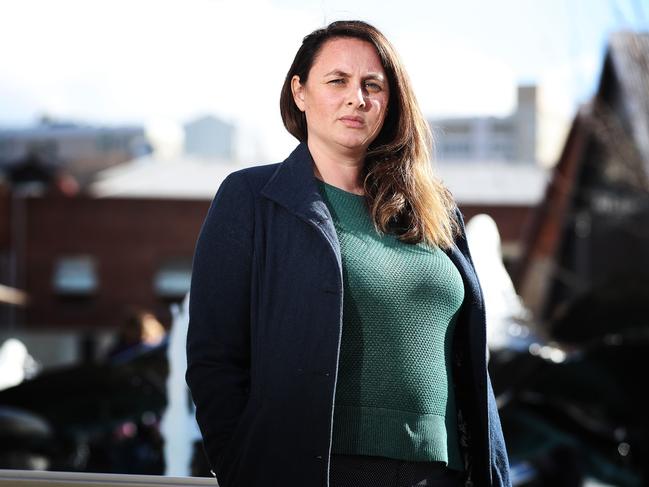Public hospitals forced to provide abortions under Labor plan
Public hospitals would be required to perform abortions and women could get access to the pill without seeing a doctor for three years under Labor’s new sexual health plan.

Health
Don't miss out on the headlines from Health. Followed categories will be added to My News.
Public hospitals would be forced to perform abortions and women could get access to the pill without seeing a doctor for three years under a sexual health plan by Labor today.
Bringing down the cost of long-acting contraceptives like the Merina or IUDs and also allowing women to obtain three-year prescriptions for the contraceptive pill are other proposals under a National Sexual and Reproductive Health Strategy which would receive an initial investment of $9.3 million over five years.
The cost of obtaining the abortion pill RU486 would be brought down while more doctors would be trained to perform medical abortions post nine-weeks gestation.
MORE: Six babies a day stillborn in Australia
MORE: Kelly O’Dwyer reveals miscarriage tragedy
MORE: What Australians want in relationships

A new Tasmanian Reproductive Health Hub would be established as well as a national telephone referral service where women could be linked to credible providers of terminations.
Opposition spokeswoman on women Tanya Plibersek said the measures were vital to give women choice over their reproductive and sexual health.
“Making the decision to end a pregnancy is difficult enough for a woman without being forced to travel hundreds of kilometres or go interstate as some women are,” Ms Plibersek said.
“For the first time, Commonwealth-State hospital funding agreements will expect termination services to be provided consistently in public hospitals. This is critical to end the patchwork of service provision in Australia.”

Labor says South Australia is the only state where abortions are consistently performed in public hospitals.
Up to one in three Australian women will have an abortion at some point in their life with 51 per cent of Australian women having an unplanned pregnancy.
Abortion still remains a crime in NSW and Tasmanian women seeking to end a pregnancy are forced to travel interstate. In South Australia women can still be charged for “unlawful” abortions.
Access is also stymied in Victoria and Queensland, despite technically being legal.
Family Planning Alliance Australia medical director Deborah Bateson said there was enormous inequality in access to abortion and contraception for women.

“We need to bring all the states into alignment on this because at the moment we’ve got a lot of fragmented care,” Dr Bateson, who has worked in the sector for 20 years, said.
“We need to ensure in a country like Australia all women have the right to have control over their reproductive and sexual health.”
Chief executive of Marie Stopes Jamal Hakim welcomed Labor’s announcement.
“What we know is that it shouldn’t be down to your postcode to determine if you have access to these services or not,” Mr Hakim said.
He said studies had shown for every $1 invested into reproductive and sexual health, it returned $11 to the public purse and he supported public hospital funding being tied to medical termination services.
“Definitely there is an economic argument here,” Mr Hakim said.
Family Planning Victoria CEO Claire Vissenga said access to services was not just an issue for rural and remote women and that even in Melbourne CBD services were strained.
She said the Coalition had “no national strategy” on these issues and was supportive particularly of the plan to increase prescription lengths for the contraceptive pill.
“Reproductive and sexual health is a right as described by the United Nations but we know women in Australia are significantly disadvantaged in choices,” she said.
SACKED CRICKET AUSTRALIA WORKER
Angela Williamson, 40, needed to access abortion services last year in Tasmania and had to fly interstate to Melbourne to do so.
She controversially was sacked from Cricket Australia after tweeting about the Tasmanian government’s policies on reproductive health.
“Having an abortion is a time where you are making an immensely a hard personal decision and that is supposed to be the hardest part, not navigating a broken or eroded system,” Ms Williamson who has contributed to a new book Choice Words on abortion.
“I absolutely welcome these announcements and we need governments who will take strong action in this area.”
Ms Williamson said providing choice to women was paramount.
“Enabling equity in access to health services is so important.”

LABOR’S SEXUAL HEALTH STRATEGY
* Review the Medicare rebate for long-acting removable contraceptives (LARCs), to make sure that cost isn’t a barrier to their use.
* Get the Therapeutic Goods Administration to advise government on options to reduce barriers to improve access to the contraceptive pill including potentially offering women three year prescriptions to the pill as is the case in New Zealand.
* Review the Medicare rebate associated with medical terminations (RU486) to address access and affordability issues particularly with out of pocket costs associated appointments and tests.
* Support doctors to be registered for medical terminations. Currently only 1500 nationally are registered out of 35,000 GPs.
* Make Commonwealth-State funding for public hospitals conditional upon them providing termination services.
* Establish a new Tasmanian Reproductive Health Hub to prevent women from having to travel to the mainland due to a lack of services.
* Fund a national telephone referral service linking women to providers of termination services.
* Progress the decriminalisation of abortion across Australia.
* Restore funding to the Australian Women’s Health Network
ABORTION LAWS IN AUSTRALIA
QLD: On October 17 2018 the Termination of Pregnancy Bill was passed in parliament, decriminalising abortion. The new legislation came into effect in December 2018. Legal to 22 weeks. Legal post — 22 weeks with two doctors’ approval. Exclusion zones are also set at 150m around termination clinics.
NSW: Abortion a crime for women and doctors. Legal when doctor believes a woman’s physical and/or mental health is in serious danger. In NSW social, economic and medical factors maybe taken into account.
ACT: Legal, must be provided by a medical professional which includes a nurse practitioner. Exclusion zones may be set at the discretion of the ACT Health Minister.
VICTORIA: Legal to 24 weeks. Legal post-24 weeks with two doctors’ approval. Illegal to protest within 150m of an abortion service.
SA: Legal if two doctors agree that a woman’s physical and/or mental health endangered by pregnancy, or for serious foetal abnormality. Unlawful abortion a crime.
TAS: Legal to 16 weeks. Legal post-16 weeks with two doctors’ approval. Illegal to protest within 150m of an abortion service.
WA: Legal to 20 weeks, some restrictions particularly for under 16s. Very restricted after 20 weeks.
NT: Legal to 14 weeks with one doctor’s approval, and at 14 — 23 weeks with an additional doctor. Not legal after 23 weeks unless it is performed to save a pregnant person’s life. Illegal to protest within 150m of an abortion service.
Source: Children By Choice


